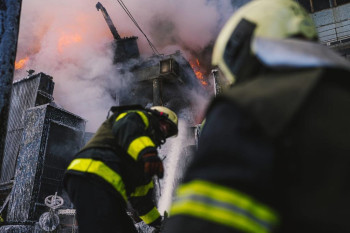Deadly attack on Vyshhorod residence: ‘I don’t have a home anymore’

VYSHHOROD, Kyiv Oblast – A rocket blast that struck a four-story residential building in Vyshhorod on Nov. 23 was so powerful that it ripped off balconies, leaving the windowless rooms open to the cold November weather.
The massive crater in front of the building left no doubt about the intensity of the explosion that twisted metal structures at the children’s playground nearby.
It would be easy to imagine locals enjoying the outdoors in this family neighborhood.
Instead, the worried silhouettes of those who used to live there were avidly looking for any signs of someone they knew, following every move of the rescuers jumping from window to window in search of survivors.
The Russian rocket that had struck the building on Nov. 23 killed at least five and injured 31 people as of 10 p.m., according to authorities.
Maksym, who lives around the corner and witnessed the blast, said he had no doubt that the casualties would be higher.
“The emergency hasn't gotten past anything yet,” he told the Kyiv Independent. “There can be so many people there.” Maksym refused to provide his last name.
Vyshhorod, a town with a prewar population of 30,000 people located just north of Kyiv, came under the fire of Russia’s fifth large-scale missile strike on Ukraine’s energy infrastructure since early October.
The latest strike caused power outages and halted water supply across the county.
According to Ukraine’s Air Force, Russian forces launched 70 missiles on Ukraine on Nov. 23, of which 51 were downed.
The strikes have become a deadly weekly routine for the civilian population, further deepening human suffering in Ukraine due to Russia’s brutal war.
Moscow openly admits that Ukraine’s energy system is one of its primary targets. According to the Geneva Conventions, attacking vital public infrastructure is a war crime.
Everything on fire
The violence of the blast blew Maksym away, he said. “My gates just pulled open. I flew into a door and another four meters through another door.”
“We ran out and saw a lot of people: someone lying there, someone screaming,” he said, pointing at what used to be the building’s entrance.
According to Maksym, the door was broken in half, blocking the exit for “a lot of people.” He says he knocked off the door and started to help people get out.
When he got closer, he saw that “everything was on fire.” “It burned up to the top, right up to the roof.”
No home
Hours after the attack, Mariam watched the rescuers' movement in search of people inside her residence. Mariam refused to provide her last name.
The 32-year-old Interior Ministry employee spoke softly, in a collected voice.
“This is my home,” she said without taking her eyes off the rescuers. “I will be 33 in five days – that’s a nice present.”
“I lived here with my mother, my family, my brother, sister, aunt, everyone.”
Her family survived the attack. They had been evacuated from the building to one of the emergency heated tents put up by the authorities to protect people from the cold.
On the street, filled with the gas smell coming from generators and lit with flashlights, emergency service workers were almost done setting up tents around the severely damaged building to protect residents from the deadly winter cold expected to reach minus three degrees Celsius that night.
Residents of the nearby buildings were also preparing for the night by fixing windows broken by the explosion wave.
Mariam’s tight grip on the vape gave away her true feelings. “I’m in shock now,” she acknowledged.
“And I feel rage because this is just an ordinary building. These houses are 50-60 years old. There is nothing here, only a school nearby, in a district where ordinary people lived,” she said.
Mariam had just arrived from work to assess the damages the Russian forces had inflicted on her home.
“I don't know anything yet — I would like to get my cats and chinchillas (from the building),” she said. “I don’t have a home anymore.”























